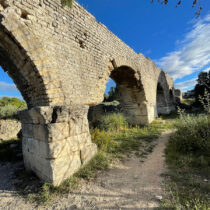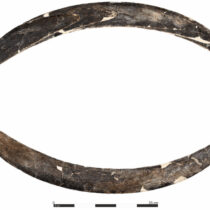Only thirty years ago, archaeological research started to throw some light on the so-called “Dark Ages” (11 th-8th century BC) through continuous work at Leukandi and Eretria. At the beginning of this period, the local works of art exhibited a short-lived influence from the East. A new artistic blossoming marked the tenth century: the settlement at Leukandi is enlarged and the funerary offerings discovered in its three cemeteries are rich and sophisticated. A monumental, templeshaped heroon (1.000 BC), excavated in one of the cemeteries, has produced an urn with the bones of the “hero”, the skeleton of a woman with rich jewels and horses’ skeletons. The finds of Leukandi attest to relations not only with the neighbouring regions but also with Egypt,the Near East and Cyprus. The ninth century is characterized by a return to local traditions and an increase in exports. Around 800 BC the settlement is abandoned and the inhabitants of Leukandi flee to other towns of the vicinity or they emigrate and establish colonies. Significant burials of warriers found at Eretria date from the end of the eight century, while at about the same time the town of Chalkida develops its outstanding mining and dying enterprises.
The Euboeans, first among all Greeks, established colonies not only in NE Greece (from Pydna to the Crimean peninsula) but also as far away as Italy and Syria. An impressive Ionic temple dedicated to Apollo Daphniphoros (= the laurel bearer) has been discovered in Eretria. This city became an important naval power and showed a most agressive attitude towards Athens, therefore it was finally punished. During the Persian wars, the Persians retaliating for the arson of Persepolis by the Greeks ruined Eretria completely, but the town managed to recover rather quickly. Decades later the Lacedaemonians occupied the entire Euboea. After the end of the Peloponnesian war (401 BC.) the cities are reformed and the bridge with the two fortifications, connecting the island with the mainland country, is built. In 377 BC. the Euboeans rejoin the Athenian League while later the Euboean’ s Common is established. The years between 350 and 198 BC mark a time of new adventures for the island that passes under Macedonian rule and is finally devastated and looted by its Roman conquerors.


